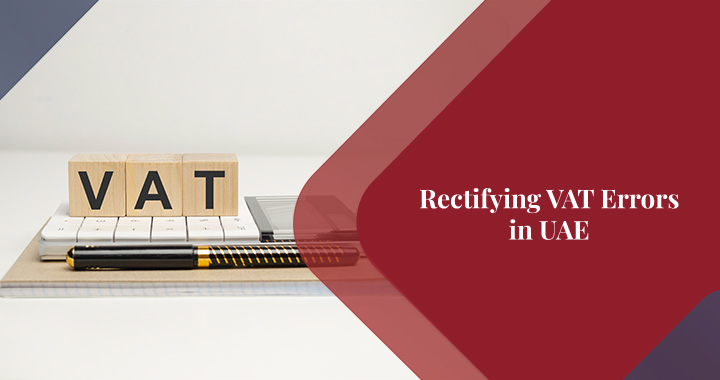VAT Return, also known as Tax Return is a periodical statement which a registered person needs to submit to the authority. Sometimes, while filing a VAT return, you will come across a terminology called VAT Error. A VAT error occurs when a taxable individual does not charge and account for the correct amount of output VAT or does not recuperate the correct amount of input tax. This applies regardless of whether a taxpayer has overpaid or underpaid the amount of tax due do to the Federal Tax Authority (FTA). Either way, the amount of tax that is paid to the FTA is incorrect and will need to be corrected.
The FTA introduced voluntary disclosure form 211 to correct errors or omission committed in filed VAT return form 201.
First thing you need to know is, except in cases of tax evasion or non-registration, there is a five-year time limit for correcting errors arising in previous VAT returns. This means that the FTA can raise an assessment for, or a taxable person can disclose to the FTA, any errors that occurred within five years from the end of the tax period in which the error occurred (starting from when VAT was introduced on 1 January 2018). In the case of Tax Evasion or non-registration, the authority can conduct a Tax Assessment up to 15 years from the end of the Tax Period in which the Tax Evasion occurred or from the date on which the taxable person should have been registered. The FTA may also charge a price where a taxable person has made a tax error.
Types of Errors and How to Correct them?
VAT Return
There might be instances where a tax return that has been submitted to the authority contains an error and results in a different amount of tax being due to the FTA, for example, the amount of output tax is lower than it should have been and/or the amount of recoverable input tax is higher than it should have been. The value of the error will prescribe the way in which it must be corrected.
If the tax value of the error is AED 10,000 or less, the error should be corrected on the tax return for the period in which the error is discovered.
If the error is discovered at a time when it cannot be corrected in this way (for example, once the taxable person is no longer VAT registered), then a voluntary revelation must be submitted to the FTA instead.
If the tax value of the error is more than AED 10,000, the error should be disclosed to the FTA via a voluntary disclosure.
A voluntary disclosure must be submitted to the FTA within 20 working days of when the taxable individual became aware of the error and using the form specified by the FTA.
Tax Invoices
There may be cases where an invoice contains an error, for example
- if tax is incorrectly charged (that is, the tax was charged but no tax was due on the supply); or
- the wrong amount of tax was charged
If the tax amount shown on the invoice is higher than it should be, the supplier should include the tax amount stated on the invoice within its tax return unless the error has been corrected through issuing a credit note. If the tax amount shown on the invoice is lower than it should be, the seller should account for the correct amount of tax (that is, what should have been charged) on its tax return.
In both cases, a seller will need to take steps to adjust for the error – for example, to issue a credit note (where the tax originally charged was too high) and/or re-issue a corrected tax invoice (where the tax originally charged was too low). For example, if you charge VAT on a zero-rated supply, then you must issue your customer with a credit note for the VAT that he has paid. On the other hand, if you did not charge VAT on a standard rated supply, then you must re-issue the tax invoice with the correct VAT amount. A beneficiary that has been overcharged or under-charged tax should contact the supplier to request a credit note or an invoice that states the correct amount of tax. This is essential as a recipient can only recover input tax if it holds a valid tax invoice for the supply, showing the correct amount of tax charged.
Tax Refunds
A person may submit an application for a tax refund to the FTA – for example, a business which is not established in a GCC Implementing State, does not conduct business in the UAE and is eligible to submit a claim for a refund of VAT incurred.
If an error was made in this application, such that the amount of the refund being claimed was more or less than it should have been (irrespective of the value of the error), then the person must submit a voluntary disclosure to the FTA within 20 business days of becoming aware of the error. For example, if you were performing your own internal audit and you discover a tax error, you must submit a voluntary disclosure to the FTA within 20 business days.
However, if the error in the tax refund application was made as a result of an incorrect tax return or incorrect tax assessment, then the provisions relating to how to correct errors in returns or assessments should apply instead – i.e. the value of the error will dictate whether it can be corrected on a subsequent VAT return or via a voluntary disclosure.
You must also know about the penalties that may occur due to the VAT errors. That is where we at Commitbiz come into the picture. We will give you every information related to your tax errors and help you complete the process. Contact us today for more information.
Which authority is responsible for VAT errors in the UAE?
The Federal Tax Authority (FTA) is responsible for errors in the VAT returns.
Which form is provided by the UAE FTA to correct errors or omissions?
A voluntary disclosure form 211 is provided by the FTA.
What to do if the VAT error is less than or equal to 10,000 AED?
You should correct the error for the period in which it is discovered.
When should the voluntary disclosure form be submitted to the FTA?
You should submit the form within 20 days of when you became aware of the error.
How much fine is to be paid if there is a failure in filing a tax return for the first time in the UAE?
A fine of 1,000 AED will be charged for failing to file a VAT return within the time frame.

